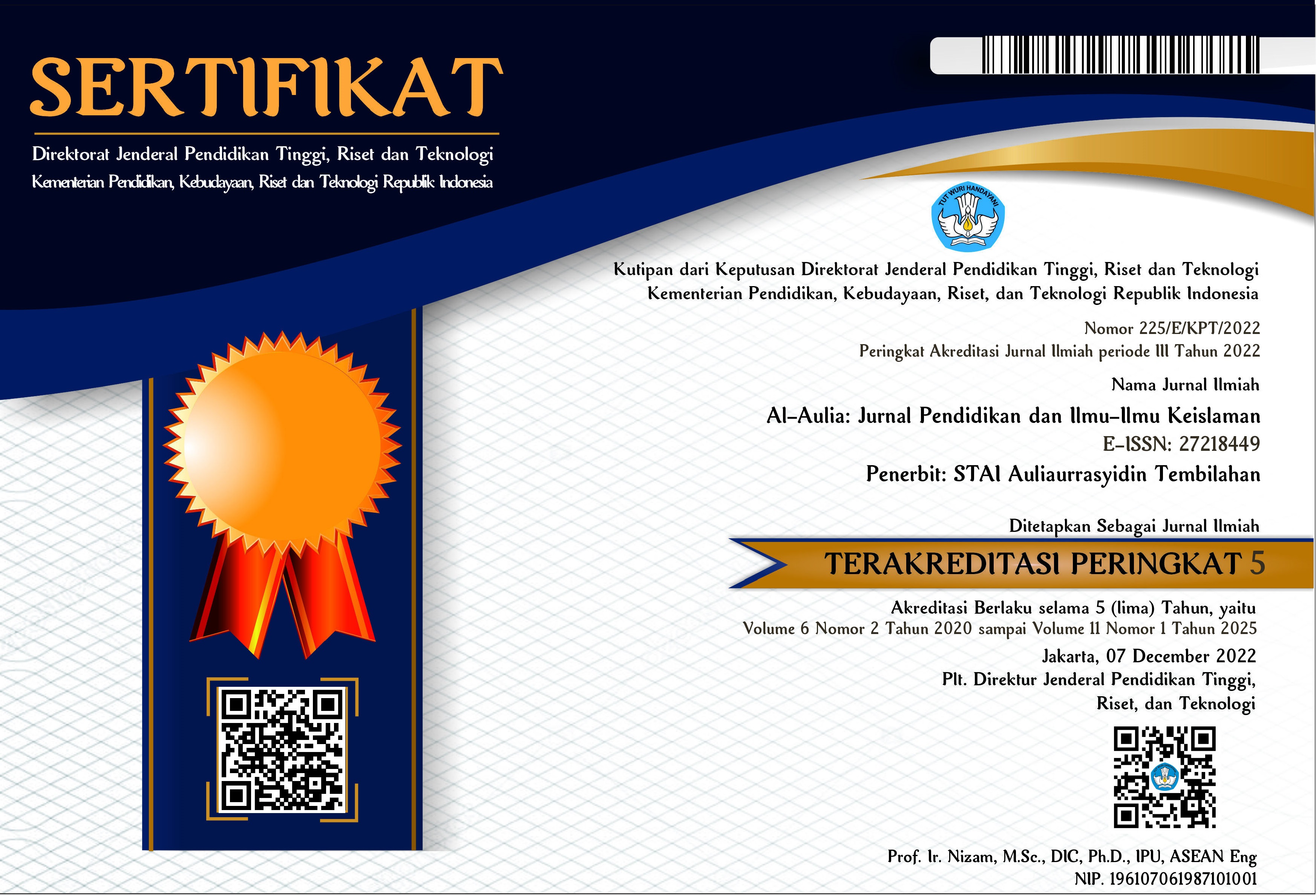Ziauddin Sardar: Membangun Epistemologi Islam
DOI:
https://doi.org/10.46963/aulia.v9i2.1194Keywords:
Epistemology, Islam, Ziauddin SardarAbstract
The lag behind Muslims from the West led to the emergence of the idea of the Islamization of science, which was initiated by one of them, al-Faruqi. However, this idea received criticism from Ziauddin Sardar. This criticism gave rise to the idea of "Building Epistemology". Therefore, this paper aims to discuss this idea. The problems in this paper are studied using a Literature Review approach. The literature used comes from journal articles that are relevant to the study of the ideas of Building Islamic Epistemology put forward by Ziauddin Sardar. Based on the discussion, it can be concluded that what al-Faruqi offered through efforts to instill Islamic values into science which is formed by western paradigms, concepts, ideologies and perceptions is wrong and has more potential to cause the Westernization of Islam than Islamization.
References
Efrinaldi, E., Toha A., & Taufiqurrahman, T. (2020). The paradigm of science integration in islamic university: The historicity and development pattern of islamic studies in Indonesia. Madania: Jurnal Kajian Keislaman, 24(1), 97-108. http://dx.doi.org/10.29300/madania.v24i1.3326
Ehsan, M. (2006). Introduction: The Ambiguous Intellectual, Science and Cultural Relations. Pluto Press, London
Kurnia, S. W., (2018). Epistemologi paradigma Islam: Studi pemikiran Ziauddin Sardar, Religious: Jurnal Studi Agama-Agama dan Lintas Budaya, 3(1), 70-79. https://doi.org/10.15575/rjsalb.v3i1.3673
Leif, S., Seyyed Hossein Nasr., & Sardar, Z (1996) Islam and science: Marginalization or modernization of a religious tradition. Social Epistemology 10, 3-4: 2.73-287.
Masthuriyah, S. (2015). Islamic science, nature, and human beings: A discussion on Ziauddin Sardar's Thoughts, Walisongo: Jurnal Penelitian Sosial Keagamaan 23(2), 233-250. https://doi.org/10.21580/ws.23.2.278
Tajuddin, M.S., & Rofie, M. K. (2014). A new paradigm of integration between science and Islam: An epistemological framework. Journal of Islam and Science 1(1),1-12. https://doi.org/10.24252/jis.v1i1.2188
Taufik, M., & Yasir, M. (2017). Mengritisi Konsep Islamisasi Ilmu, dalam Ushuluddin, Pekanbaru: Universitas Islam Negeri Syarif Kasim Riau
Saifullah Idris. (2013) Islamisasi Ilmu: Reorientasi Ilmu Pengetahuan Islam (Melihat Pemikiran Ziauddin Sardar).
Tony Stevenson. (2008) Ziauddin Sardar: Explaining Islam to the West’ in Profiles in Courage: Political Actors and Ideas in Contemporary Asia, editors, Gloria Davies, JV D’Cruz and Nathan Hollier, Australian Scholarly Publishing, Melbourne.
Ziauddin Sardar. (1984). Jihad Intelektual: Merumuskan Parameter-Parameter Sains Islam. Bandung: Risalah Gusti
Ziauddin Sardar. (1984). Jihad Intelektual; Merumuskan Parameter-Parameter Sains Islam. Bandung: Risalah Gusti.
Ziauddin Sardar (1987). Masa Depan Islam. Bandung: Penerbit Pustaka.
Ziauddin Sardar. (1988). Rediscovery Islamic Epistemology in Islamic Futures: The Shape of Ideas to Come. Pelanduk Publication, Kuala Lumpur.
Ziauddin Sardar. (1982). Science and technology in the Middle East; a guide to issues, organizations, and institutions.
Ziauddin Sardar. (1988). The Future of Muslim Civilization. Malaysia: Pulanduk Publications
Ziauddin Sardar. (1984). The Touch of Midas: Science Values and Environment in Islam and the West. Manchester University Press, Manchester.
Downloads
Published
Issue
Section
License
Copyright (c) 2023 M. Taufik Ihsan

This work is licensed under a Creative Commons Attribution-ShareAlike 4.0 International License.
Authors who publish with this journal agree to the following terms:
1. Copyright on any article is retained by the author(s).
2. The author grants the journal, right of first publication with the work simultaneously licensed under a Creative Commons Attribution License that allows others to share the work with an acknowledgment of the work’s authorship and initial publication in this journal.
3. Authors are able to enter into separate, additional contractual arrangements for the non-exclusive distribution of the journal’s published version of the work (e.g., post it to an institutional repository or publish it in a book), with an acknowledgment of its initial publication in this journal.
4. Authors are permitted and encouraged to post their work online (e.g., in institutional repositories or on their website) prior to and during the submission process, as it can lead to productive exchanges, as well as earlier and greater citation of published work.
5. The article and any associated published material is distributed under the Creative Commons Attribution-ShareAlike 4.0 International License







